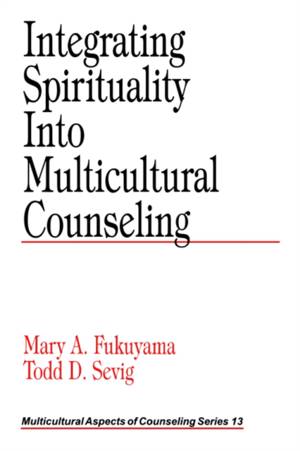
- Retrait gratuit dans votre magasin Club
- 7.000.000 titres dans notre catalogue
- Payer en toute sécurité
- Toujours un magasin près de chez vous
- Retrait gratuit dans votre magasin Club
- 7.000.0000 titres dans notre catalogue
- Payer en toute sécurité
- Toujours un magasin près de chez vous
253,45 €
+ 506 points
Format
Description
Fukuyama and Sevig have compiled a significant volume that underscores the importance of counselors addressing clients′ spiritual values and experiences in the context of providing culturally-competent services. . . .One of the primary strengths of this book is that it is reader-friendly as the authors are quite skillful in blending scholarly and personal perspectives throughout. I would highly recommend this book to counselors, supervisors, academicians, researchers, and students who wish to expand their understanding of the impact of spiritual issues in the lives of culturally-diverse clients.- -Madonna G. Constantine, Columbia University "Finally! A book that examines the interface between spirituality and multiculturalism. Mary Fukuyama and Todd Sevig have created a timely masterpiece that provides a holistic view of multiculturalism, one that integrates spirituality into its fabric. The authors appropriately cover less known spiritual paths, such as Native American and Afrocentric perspectives. The chapter on developmental models of the spiritual journey is especially useful to counselors and other helping professionals. The authors also tackle the challenging question of positive and negative expressions of spirituality. The self awareness questions in each chapter prompt readers to examine their own spiritual and multicultural experiences and beliefs. Numerous case examples stimulate helping professionals to grapple with realistic and multifaceted issues that their client′s face. The integration of materials from diverse spiritual and multicultural perspectives makes this book a unique reference for anyone who is interested in this topic. As Fukuyama and Sevig note, spirituality is highly subjective and dynamic; their goal is to identify and explore good questions rather than propose definitive answers, The authors have succeeded in their goal. I highly recommend their book to counselors and all helping professionals; for all counseling is multicultural, and spirituality is an essential component of the human experience." --Pamela Highlen, Ohio State University In today′s world, multicultural contact and the search for meaning go hand in hand. This book provides an overview of spiritual and multicultural processes that will challenge and energize professionals who desire to engage in the complexities of the postmodern world. The authors propose that integrating spiritual values into multicultural learning and exploring spirituality from multicultural perspectives are synergistic and mutually reciprocal processes. Chapter topics include understanding multicultural worldviews and developmental models of the spiritual journey, integrating spiritual and multicultural competencies, clarifying healthy and unhealthy expressions of spirituality, exploring spiritual issues expressed through pain and loss as well as needs for power and creativity. Understanding counseling process issues including ethical concerns, and integrating spiritual interventions into one′s own counseling style.
Spécifications
Parties prenantes
- Auteur(s) :
- Editeur:
Contenu
- Nombre de pages :
- 200
- Langue:
- Anglais
- Collection :
Caractéristiques
- EAN:
- 9780761915843
- Date de parution :
- 28-07-99
- Format:
- Livre broché
- Format numérique:
- Trade paperback (VS)
- Dimensions :
- 155 mm x 229 mm
- Poids :
- 276 g

Les avis
Nous publions uniquement les avis qui respectent les conditions requises. Consultez nos conditions pour les avis.






